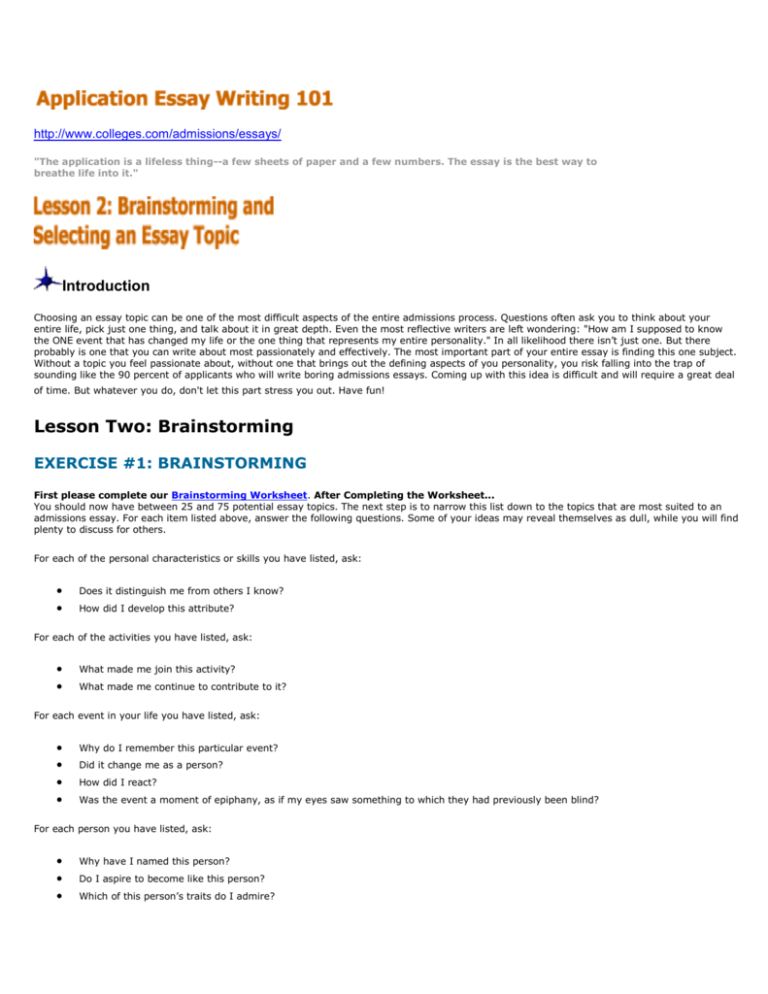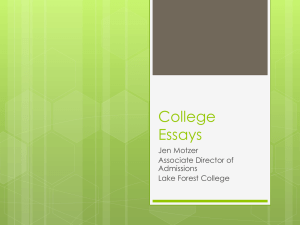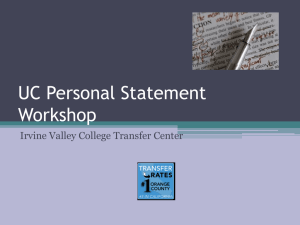College Application Essay - Lesson Two
advertisement

http://www.colleges.com/admissions/essays/ "The application is a lifeless thing--a few sheets of paper and a few numbers. The essay is the best way to breathe life into it." Introduction Choosing an essay topic can be one of the most difficult aspects of the entire admissions process. Questions often ask you to think about your entire life, pick just one thing, and talk about it in great depth. Even the most reflective writers are left wondering: "How am I supposed to know the ONE event that has changed my life or the one thing that represents my entire personality." In all likelihood there isn’t just one. But there probably is one that you can write about most passionately and effectively. The most important part of your entire essay is finding this one subject. Without a topic you feel passionate about, without one that brings out the defining aspects of you personality, you risk falling into the trap of sounding like the 90 percent of applicants who will write boring admissions essays. Coming up with this idea is difficult and will require a great deal of time. But whatever you do, don't let this part stress you out. Have fun! Lesson Two: Brainstorming EXERCISE #1: BRAINSTORMING First please complete our Brainstorming Worksheet. After Completing the Worksheet... You should now have between 25 and 75 potential essay topics. The next step is to narrow this list down to the topics that are most suited to an admissions essay. For each item listed above, answer the following questions. Some of your ideas may reveal themselves as dull, while you will find plenty to discuss for others. For each of the personal characteristics or skills you have listed, ask: Does it distinguish me from others I know? How did I develop this attribute? For each of the activities you have listed, ask: What made me join this activity? What made me continue to contribute to it? For each event in your life you have listed, ask: Why do I remember this particular event? Did it change me as a person? How did I react? Was the event a moment of epiphany, as if my eyes saw something to which they had previously been blind? For each person you have listed, ask: Why have I named this person? Do I aspire to become like this person? Which of this person’s traits do I admire? Do I aspire to become like this person? Which of this person’s traits do I admire? Is there something that this person has said that I will always remember? Did he or she challenge my views? For each of your favorites and least favorites, ask: Why is this a favorite or least favorite? Has this thing influenced my life in a meaningful way? For each failure, ask: What if anything did I learn from this failure? What if anything good came out of this failure? In answering these questions, you will probably find that you have a great deal to talk about, at least for five to seven topics. You must now confront the underlying problem of the admissions essay: find the one topic that will allow you to synthesize your important personal characteristics and experiences into a coherent whole while simultaneously addressing your desire to attend a specific institution. While most admissions essays allow great latitude in topic selection, you must also be sure to answer the questions that were asked of you. Leaving a lasting impression on someone who reads 50 to 100 essays a day will not be easy, but we have compiled some guidelines to help you get started. Lesson Two: Selecting a Topic EXERCISE #2: SELECTING A TOPIC In this exercise, you will find a list of Do’s and Don’ts for selecting a topic, along with comments from long-time admissions officers. For each of your five to seven potential topics, fill in this checklist. If you find yourself repeatedly answering "no" to these questions for any given topic, you should drop it and move on to another. 1. Have I selected a topic that describes something of personal importance to my life? Admissions Officer Says: "Personalize your essays as much as possible-generic essays are not only boring to read, they’re a waste of time because they don’t tell you anything to help you get to know the applicant any better." 2. Am I avoiding a gimmicky topic? You should be very, very careful of trying to write your essay in iambic pentameter or with lots of jokes. Almost always, this is done poorly and is not appreciated by the admissions committee. Nothing is worse than not laughing at something that was written to be funny. Admissions Officer Says: "Gimmicks are a big mistake, and a sarcastic or flippant tone will often offend." 3. Does my topic stay away from information listed elsewhere on my application? Don’t mention GPAs or standardized test scores in your essay. That’s what the resume and other parts of the application are for. Admissions Officer Says: "Listings of anything are dull, no matter how impressive." "Essays should be about more than just a running tally of accomplishments." 4. Will I be able to offer vivid supporting paragraphs to my essay topic? Do not choose a topic if you cannot provide concrete examples for the body of the essay. Admissions Officer Says: "Details provide the color, the spice, and the life of the essays." "As the saying goes, if you’re going to talk the talk, you better walk the walk." 5. Can I fully answer the question asked of me? Can you address and elaborate on all points within the specified word limit, or will you end up writing a poor summary of something that might be interesting as a report or research paper? If you plan on writing something technical for an application, make sure you can back up your interest in a topic and not merely throw around big scientific words. Unless you convince the reader that you actually have the life experiences to back up your interest in neurobiology, the reader will assume that you are trying to impress him or her with shallow tactics. Also, be sure that you can write to admissions officers and that you are not writing over their heads. Admissions Officer Says: "Actually answer the question they ask. Many people just list off their accomplishments and never relate it to the theme of the question." 6. Will my topic keep the reader's interest from the first word? The entire essay must be interesting, considering admissions officers will probably spend only a few minutes reading each essay. Admissions Officer Says: "If the first paragraph doesn’t fix my attention, like anyone I’m prone to skimming." 7. Is my topic unique? Some students are so concerned about making the correct impression that they edit out anything that would help their essay stand out. They submit a "safe" essay that is, in reality, sterile, monotonous, and deadly boring. Most topics are in fact overdone, and this is not necessarily a bad thing, but a unique and convincing answer to a classic topic can pay off big. Furthermore, when applying to a competitive program that might be out of your reach, taking a risk in the essay may help your chances by standing out. Admissions Officer Says: "Applicants should not be afraid to go out on a limb and be themselves-even when that means incorporating humor or being a little bit controversial." 8. Am I being myself? Admissions officers want to learn about you and your writing ability. You must develop your own voice and tell YOUR story, not the story you think the reader wants to hear. Write about something meaningful and describe what you did and felt, and your essay will be unique. Many people travel to foreign countries or win competitions, but your feelings during these events are unique to you. Unless a philosophy or societal problem has interested you intensely for years, stay away from grand themes that you have little personal experience with. Admissions Officer Says: "It is through the essay that the admissions officers reading the application will feel that they have truly gotten to know you." 9. Does my topic avoid hot-button issues that may offend the reader? If you write on how everyone should worship your God, how wrong or right abortion is, or how you think the Republican Party is evil, you will not get into the college of your choice. The only thing worse than not writing a memorable essay is writing an essay that will be remembered negatively. Stay away from specific religions, political doctrines, or controversial opinions. You can still write an essay about Nietzsche's influence on your life, but express understanding that not all intelligent people will agree with Nietzsche's claims. Emphasize instead Nietzsche's influence on YOUR life, and not why you think he was wrong or right in his beliefs. Admissions Officer Says: "It is dangerous for a non-professional (especially a high school student) to attempt writing as though the essay will be presented at a professional conference. You may be writing to someone who knows much more than you and will be irritated by your hackneyed proclamations." 10. Is my essay honest? Unless you are a truly excellent writer, your best, most passionate writing will be about events that actually occurred. While you might be tempted to invent hardship, it is completely unnecessary. Write an essay about your life that demonstrates your personality. Admissions Officer Says: "After 15 years of reading hundreds of essays a year, you develop an amazing ability to see straight through the bull." 11. Will an admissions officer remember my topic after a day of reading hundreds of essays? What will the officer remember about your topic? What will the officer remember about you? What will your lasting impression be? 12. If you are writing about something unfortunate that has happened to you, ask: Am I able to highlight my impressive qualities under difficult circumstances without sounding pathetic? Unless you only use the experience as a lens with which to magnify your own personal characteristics, you will not write a good essay. Graduate and professional school applicants should generally steer clear of this topic altogether unless the experience can arguably help one become a better businessperson, doctor, lawyer, or scholar. 13. Does my essay fit in well with the rest of my application? Does it explain the unexplained and steer clear of what is already obvious? For example, if you have a 4.0 GPA and a 1500 SAT, no one doubts your ability to do the academic work; addressing this topic would be ridiculous. However, if you have an 850 SAT and a 3.9 GPA or a 1450 SAT and a 2.5 GPA, you would be wise to incorporate into your essay an explanation for the apparent contradiction. For example, perhaps you were hospitalized or family concerns prevented your dedication to academics; you would want to mention this in your essay. However, do not make your essay one giant excuse. Simply give a quick, convincing explanation within the framework of your larger essay. 14. Does my topic avoid mentioning my weaknesses? You want to make a positive first impression, and telling an admissions officer anything about drinking, drugs, or partying undermines your goal. EssayEdge editors have read more essays on ADD (Attention Deficit Disorder) than we would hope. Why admit to weakness when you can instead showcase your strengths? 15. If you think you can add diversity to the school to which you are applying, ask: Does my essay specifically demonstrate how my uniqueness will contribute to the realm of campus opinion, the academic environment, or the social life? Every college, professional school, or graduate school wants to increase diversity. For this reason, so many applicants are tempted to declare what makes them different. However, simply saying that you are a black, lesbian female will not impress admissions officers in the least. While an essay incorporating this information would probably be your best topic idea, you must subtly handle the issue by addressing your own personal qualities and how you overcame stigma or dealt with social ostracism. If you are a rich student from Beverly Hills, whose father is an engineer and whose mother is a lawyer, but you happen to be a minority, an essay about how you dealt with adversity would be unwise. Once you have used this checklist for each of the five to seven topics you came up with in Lesson One, narrow the list down to the three topics that most easily pass all of the suggestions above. a. If more than three topics pass the test above, then simply choose the three that you are most excited about. b. If fewer than three topics pass the test, go back to your long list in Lesson One and run a few more potential topics through our checklist. At this point, you might have a topic so inspiring that the essay writes itself. However, even seemingly boring topics can be made into exceptional admissions essays with an innovative approach. In writing the essay you must bear in mind your two goals: to persuade the admissions officer that you are extremely worthy of admission and to make the admissions officer aware that you are more than a GPA and a standardized score, that you are a real-life, intriguing personality. Unfortunately, there is no surefire step-by-step method to writing a good essay. EssayEdge editors will recast your essay into a beautifully sculpted masterpiece, but every topic requires a different treatment since no two essays are alike. Lessons 3 to 6 will guide you through the various stages of writing a first-rate essay. One Essay, Multiple Applications By now, you have figured out that you can save time by submitting the same or similar essays for the applications to various schools. If you are creative, you will be able to plug in many of your answers into some not so similar questions, too. It is fine to lift whole paragraphs or even entire essays and apply them to different questions-as long as you do so seamlessly. Be absolutely sure that you have answered the question asked. Pay special attention to the introductions and conclusions-this is where cutting and pasting is most evident. Thorough proofreading is imperative if you take shortcuts like these. If a school notices that you have obviously swapped essays without even bothering to tailor them to the questions at hand, it shows them that you are lazy and insincere. If the question requires an answer specific to the school, you should show that you have read the college’s web page, admissions catalog, and have an understanding of the institution's strengths. L.,







